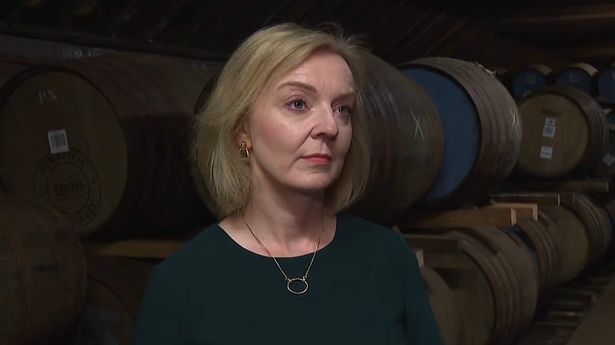The first act of Liz Truss’ government opened this morning, with the prime minister announcing her much-trailed package to ease the crisis of rocketing energy bills menacing Britain’s households and businesses.
Ofgem’s near-discredited domestic price cap will be pegged for two years from October at a notional £2,500 annual spend for an ‘average’ home, instead of the £3,549 figure announced last month, the prime minister told the Commons. The current ‘ceiling’, operating since April, is £1,971.
The un-targeted £400 discount for all households, previously announced by Truss’ rival Rishi Sunak for the Conservative leadership, will be honoured.
Businesses have never been covered under the three-year old Ofgem cap. They will be from next month, but only for six months. After April, unspecified “vulnerable industries” may receive targeted support, the PM told the Commons. Decisions as to which will be taken at a review in January.
The new premier offered supposed new routes to energy security and supply, freeing fracking onshore in England and Wales and promising expanded North Sea extraction.
Truss repeated her refusal, though, to impose a windfall tax on suppliers, as urged by Labour and the LibDems. The Treasury, to which Truss has appointed former energy secretary Kwasi Kwarteng, calculates Britain’s energy companies will earn around at £170 billion in super-normal profits over the next two years.
Structural reform initiated by Truss this morning to UK power markets includes making a start on splitting the retail prices of electricity away from an assumed marginal cost factor for generation. Under the present regime, this is exorbitantly expensive gas.
Renewables margins hit
In a move welcomed by the renewables industry, suppliers now of 40% of British electricity, generators reliant on effectively cost-free wind, hydro and solar will now be opened up to renegotiation of tariffs and supply contracts, to levels expected to be far below current market prices.
The Renewables Energy Association greeted Truss’ reform, even though it threatens to deliver a big hit to green suppliers’ profits.
“It makes no sense to allow the exorbitantly high cost of gas to set the price for the whole of the electricity market”, said the REA’s Dan McGrail. “We’re keen to work collaboratively with the government on this issue”
Integrated renewables generator and retailer Octopus Energy, with over 4 million UK customers, was equally happy.
Founder and CEO Greg Jackson said: “It’s great to see this major support for households and businesses. Companies and government are now working through the details and customers should sit tight and wait to hear from their energy supplier. Nothing will change until 1st October and we’ll be in touch with everyone before then.”
Green levies said to add £150 to bills each year will be suspended, the premier told MPs. Costs of servicing continuing clean generation incentives such as the Renewables Obligation and the Feed in Tariff to around a million microgenerators will be met instead now out of public borrowing
Truss this morning repeated her refusal to levy a windfall tax, such as introduced this week by Germany’s government.
Tomorrow, in Brussels…
The European Commission has since autumn 2021 been developing EU-wide measures to combat rocketing hydrocarbon prices. In the year to January, Eurostat reports, power prices rises averaged 21% across the EU-26, and over 40% for retail gas.
The EU’s proposals to reduce prices averaging centre around
- compulsory re-stocking of Europe’s plentiful gas silos
- reducing EU gas consumption by 15% over the next 15 months
- more capacity to store the commodity, enforced building insulation, and
- greening supply of renewable power, including at the home and local level.
Microgeneration kit, such as solar panels, being made compulsory for all new buildings in the EU026 is one Commission recommendation before energy ministers tomorrow.
Announcing her UK government’s new Energy Price Guarantee today, Truss told MPs it will limit the price suppliers can charge people for units of gas. But under questioning, she resisted specifying a figure.
On total costs of today’s market intervention, Truss offered no information. Estimates from expert observers of additions to government borrowing flowing from the reliefs range from £90 billion to £160 billion, depending on globally traded wholesale gas prices. These will remain as long as Putin’s invaders remain in Ukraine.
Bond yields harden, dollar parity beckons
As a share of gross domestic product, GDP, Government borrowing has risen in twelve years of Conservative-led rule from 30% in 2010 to around 98%, as reported by the Office of Budget Responsibility.
With government bond margins widening, and the pound weakening towards $1.14 against the dollar, gloomier analysts predict the grandchildren of today’s UK voters will be on the hook for today’s measures.
Ed Milliband, Labour’s energy spokesperson and former climate change secretary, had earlier accused the premier, who in the 1990s worked for Shell as a lobbyist and accountant, as being politically in hoc to the energy suppliers.
Milliband told BBC Radio Four’s Today programme: “This is a proposal from Energy UK, and let’s be clear about this proposal: it would lock in massive windfall profits for these electricity generators.
“What Energy UK have said”, alleged Milliband, “is we’ll accept slightly lower prices now, so we can have much higher prices over the following 15 years. This would be a terrible deal for the British people, a terrible deal for billpayers.
“It is much better – if there are these unexpected windfalls, and there are – the right thing to do, the fair thing to do, is not to do some dodgy deal with these companies, but to do a windfall tax”.
Dhara Vyas, Energy UK’s director of advocacy, did not respond directly to Miliband’s charge. Instead he warmly greeted Truss’s intervention.
“Energy UK has been calling for intervention to match the scale of this crisis so we very much welcome the Prime Minister’s announcement and immediate focus on energy.
“We hope it will help ease the worries customers were facing about the winter. We shouldn’t forget though that that many households are already struggling with the bill rises so far, and wider cost of living challenges, and suppliers continue to do all they can to provide extra support to those that need it most.
“It’s also good to see much-needed measures put in place to help business and other non-domestic customers who have also been facing huge concerns over their energy costs, as we have been highlighting.
“Our members will now be working closely with Government on the details of the scheme in order to implement the new price cap level as quickly as possible and communicate it to their customers. Wholesale gas prices are likely to remain high for some time so we need to be prepared for this support to be in place over the next year, and there needs to be a clear exit strategy from Government.
“This means focusing on what we can do to bring the cost of energy down for customers over the longer term, and the best way to do this is by expanding our sources of clean, domestic power like wind and solar – as the quickest and proven route to energy security and lower bills – and by making our homes and buildings energy efficient. This must be accompanied with reform to create a market that allow consumers to benefit fully from the low cost of clean generation,” said the Energy UK spokesperson.
This afternoon, a spokesperson for Britain’s high-consuming chemicals makers gave Truss’s steps a guarded welcome, but craved harder information.
Chief executive of the Chemical Industries Association Steve Elliott said “Chemical businesses will be breathing a sigh of relief over what the Prime Minister has said, but we still do not know the detail.
“On the surface we welcome the promised 6-month cap on the price per unit of gas and power,” Elliott added. “But we obviously need to know as soon as possible what that cost per unit of gas and power will be and whether the rate is the same for business as it would be for domestic consumers.
“It was also good to hear the commitment to suspend green levies which should give business relief on both the wholesale and policy cost elements of its bills. Again, we look forward to further detail on this”, said the chemicals industries’ lobbyist.




